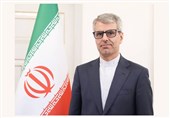US Considers Providing Cluster Munitions to Ukraine
TEHRAN (Tasnim) - The United States government is "strongly considering" sending cluster munition warheads to Ukraine that could be a part of a new weapons package in July, CNN reported, citing multiple unnamed sources briefed on the Biden administration's plans.
As the Ukrainian counteroffensive is disappointing the US and as it is unclear whether the level of artillery ammunition Kiev is using is sustainable, the US is supposedly looking into sending cluster munitions to Ukraine.
An official confirmed that the US is contemplating providing dual-purpose improved conventional munitions (DPICMs) to Ukraine but did not offer a specific timeline for the announcement.
DPICMs are surface-to-surface warheads that explode and scatter multiple small munitions or bombs over wide areas, causing extensive destruction. They can be shaped charges that penetrate armored vehicles or fragmented to pose a greater threat to personnel.
The use of cluster munitions has faced opposition from human rights groups due to concerns about unexploded bomblets, or duds, that can pose risks to innocent civilians after the conflict.
Despite Ukraine's request for DPICMs since last year, the proposal has encountered resistance because of the Convention on Cluster Munitions, an international treaty that prohibits the transfer, use, and stockpiling of such weapons. While the US, Ukraine, and Russia are not signatories to the treaty, over 100 countries have ratified it.
During the Cold War, the US developed cluster munitions and stockpiled a significant quantity, with many nearing the end of their shelf life.
A bipartisan group of Congress members recently sent a letter urging the Biden administration to provide Ukraine access to this "untapped, vast arsenal." DPICMs can be fired from artillery systems that the US has already supplied to Ukraine.
Representative Jason Crow, a member of the Armed Services Committee, sent a letter to Defense Secretary Lloyd Austin seeking details on DPICM dud rates and available variants in the US stockpile that could be sent to Ukraine.





